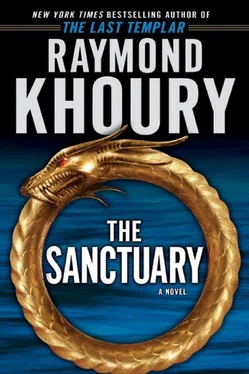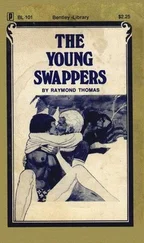Finding it was one thing.
Announcing it, revealing it to the world, and making sure that it was available and shared by all…that was a far more insurmountable challenge.
The world wasn’t ready for it, so much was certain. Powerful forces would be aligned to smother it, to keep it from altering — and empowering — mankind. Immortality — spiritual, individual immortality, that is — was a gift only religion was allowed to bestow. Nothing else could be allowed to alleviate the dread of the specter of death’s inevitable and irresistible invitation. The gift he was pursuing was sacrilegious, unthinkable. The Church would never allow it. Who was he to overcome such venomous hostility?
Confusion flooded his mind. Countering his weariness and his feelings of despair was the observation that, despite everything, the future held promise. With every passing year, he felt the winds of change blowing through the cities of men around him. Salons and coffeehouses were brimming with new ideas that were challenging ignorance, tyranny and superstition. Religious dogma and persecution were being undermined. Rousseau, Voltaire, Diderot, and others were feverishly working while warding off the suppression of their works by the ever-present Jesuits. People were finding themselves lifted and inspired by the words of great thinkers who believed that man was essentially good, and that happiness in this earthly life, achieved through social fraternity and advances in sciences and in arts, was a far more sensible and noble aspiration than hoping to reach paradise through penitence.
They were beginning to dare to value their lives more than their afterlives.
But there was still a lot to overcome. Poverty and sickness, chiefly. Premature death lurked around every corner, and the most brilliant minds were still trying to understand what the human body was made of and how it worked. This would be a huge distraction to their work, and it could have disastrous effects. And beyond all that was the seemingly intractable issue of man’s greed, his innate propensity to covet and amass. As St. Germain had witnessed, firsthand, in di Sangro.
St. Germain looked at the sleeping silhouette by his side. He reached out and stroked her naked shoulder. He studied her face, radiant even in sleep, and saw promise and inspiration in its finely sculpted lines, and it tormented him. Something deep within him tore.
He felt exhausted.
Perhaps it was all unattainable. Perhaps it was time to be selfish.
Perhaps it was time to give up.
The thought brought him comfort. But there were more pressing problems to solve.
Either way, he’d have to leave. He had the ability to travel and reinvent himself. He’d undertaken a couple of sensitive missions for the king, who, in another misguided attempt to assert himself, had instituted le Secret du Roi , the “king’s secret,” a covert effort of agents he would send abroad to pursue objectives that were mostly opposed to his publicly announced policies, such as seeking peace with the British. St. Germain could make use of the system to slip away and resettle in secret.
With a heavy heart, he knew it was the only option.
As if reading his mind, Thérésia stirred beside him and stretched awake. Her face beamed with a luminous smile as she curled her body into his.
She seemed to read the expression on his face, and her face darkened for a quiet moment, before she asked uncertainly, “You’re going to leave Paris, aren’t you?”
He couldn’t bring himself to lie, not to her. He simply nodded without taking his eyes off her.
She held his gaze, then leaned in and gave him a languorous kiss. When she finally pulled back, she simply said, “I want to go with you.”
He looked at her and smiled.
The campus was barely stirring to life as Ramez moved cautiously down the quiet, tree-shaded lane that led to Post Hall.
He’d hardly slept. He’d watched his clock tick the interminable hours away, minute by minute, and by the time the sun had finally deigned to make its appearance, he couldn’t take the confinement anymore. Hesitantly, he’d emerged from his apartment and made his way to the university, looking over his shoulder, scanning the street as he hurried along, alert to anything that looked even remotely out of the ordinary.
The building itself was deserted this early in the morning. The most conscientious of the staff didn’t come in before seven thirty, which wasn’t for another half hour. He paced around his office, looking out onto cypress trees outside, stealing anxious glances at the cell phone on his desk, tormented by indecision — and by fear.
As he heard the first of his colleagues trickling into the department, he decided to put an end to the ulcerous pain that was knotting up his chest and grabbed his phone.
* * *
The ferret watched intently as the taller detective spoke on the phone. Reading between the lines, he realized what was going on. His suspicions were soon confirmed once his partner hung up. The man who’d called worked with the kidnapped American professor at the university. He’d been contacted by the Iraqi antiques smuggler they were looking for, who wanted to make a deal before coming in. He was scared.
The taller detective had told him to stay put; he and his partner would be there shortly.
He told the ferret to get ready to head out to the university with him and picked up his cell phone to make a call. He wasn’t exactly bolting out the door at the news. That was good.
The ferret guessed he’d be calling the American agent to give him the news. He had to move fast. They weren’t paying him to stand idle.
He had to let them know. Then he had to delay things at the station long enough for them to get there first.
He told his partner he needed to take a quick leak, then left the room. He found a quiet corner in an interview room, made sure he wouldn’t be overheard, and speed-dialed Omar’s number.
* * *
The brief cell-phone ring echoed through the apartment and roused Mia from an almost comatose sleep. She sat up and rubbed her eyes, feeling groggy. She wasn’t sure what time it was. The room was completely dark, the outside world ruthlessly blotted out by roller shutters. She noticed some sunlight creeping in from under the bedroom door and realized it was morning.
She was surprised at how deeply she’d been gone, given the circumstances. She ran her hands through her hair, pulled on her pants, and stumbled out of the bedroom to find Corben in the kitchen. He was already dressed and was talking into the phone while stuffing some files — including the one he’d taken from Evelyn’s apartment — into his briefcase.
His body language, focused and urgent, sent a spasm of dread down Mia’s spine.
He saw her and tilted the phone upwards, away from his mouth. In a low but firm voice, he said, “We’ve got to go.” His steely expression filled in the rest. They had to go now . Her questions would have to wait.
She’d hardly managed to get her shoes on before they were heading down in the elevator to the underground garage. Corben filled her in as they hurried into his Cherokee, and within minutes they were rushing towards the university.
“They’re sending a couple of men over,” Corben concluded, “but I’d rather have Ramez in our custody than in theirs when that call comes in.”
He checked his watch. Mia checked hers. “So this Farouk’s supposed to call him at noon?”
Corben nodded. “We’ve got about four hours.”
Mia’s mind was racing ahead questioningly, a surge of adrenaline flooding her senses. “So why wasn’t he picking up his phone last night when you tried calling him? What if it had been Farouk? What if he’s changed his mind, or something’s happened to him?”
Читать дальше












